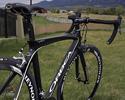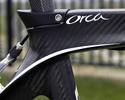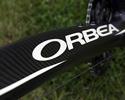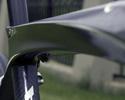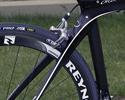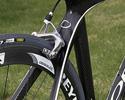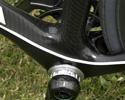
Recently on Cyclingnews.com |
On test: Orbea Orca, August 20, 2008
Olympic gold for Orbea's flagship
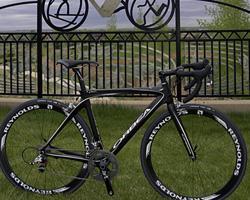
|
Orbea gave its range-topping Orca road racer a mid-season refresh with a stiffer feel, lighter weight and sharper reflexes. Cyclingnews technical editor James Huang wraps up a four-month journey on one just as Spain's Samuel Sánchez piloted his own to Olympic glory in Beijing.
Looks can be deceiving
The current Orbea Orca looks virtually unchanged from when its current shape was introduced just two years ago. Yet though it wears the same curvy exterior, Orbea says this latest iteration is a substantial 20 percent stiffer and 10 percent lighter; claimed weight is now just 1290g for the frame, fork and headset.
Updates include a revamped fiber lay-up schedule, upgraded fiber types, sleeker one-piece alloy dropouts, and new carbon fiber and magnesium bits that once were aluminum. Even the more spartan finish saves a few precious grams though some will undoubtedly lament the loss of color.
Our 51cm tester came built with a sultry mix of top-notch components including a complete SRAM Red group, deep-section Reynolds Assault carbon clincher wheels wrapped with Michelin's Pro2 Race tires, a Selle Italia Flite Gel Flow saddle, and an assortment of finishing goodies from Orbea's in-house brand, Zeus. Total weight without pedals was just 6.78kg (14.9lb).
Setting sail on the Orca
While some bikes absolutely floor us based on one or two performance metrics, the Orca impresses not because of its raw numbers but rather its overall combination of attributes. Much like a well-tuned German car, it isn't the absolute best in any one category but it's seemingly near the top of the scale in every category and the total package is fantastically capable.
First off, Orbea's redesign has shed enough weight from last year's Orca to bring the new iteration squarely into the ultralight category. Claimed weight for a bare 54cm frame (we tested a 51cm) is just 875g and our particular test build also proves that the complete bike can be nearly as feathery as you want (and fitting carbon tubulars would send the bike into silly-light territory). Other frames might be a hair lighter, but the gaps are narrowing.
Under power, the Orca is competitively stiff (and notably more rigid than before) but it still doesn't quite have the raw ferocity of ultra-speedsters like the Scott Addict or Isaac Sonic. As compared to those two, there's the slightest bit of hesitation when you mash on the pedals for a sprint as well as some steerer tube flex when you wrench the bars. Unless you've ridden something similarly über-rigid though, you're unlikely to notice. Wind it up with a tad more finesse instead of just mashing down with brute force and it still rewards you with gobs of speed.
Orbea may have been able to jack up the stiffness numbers by increasing the tube sizes even more, but the Orca's moderately oversized pipes feel reassuring solid and the thicker-than-paper tube walls bode well for long-term durability, thankyouverymuch.
Handling is reassuring solid overall with neutral manners and good stability at speed. The Orca is no twitchy crit bike but for most people that's a good thing. Rider positioning is still on the racier end of things though, so if you were looking for something a little more upright, you can probably stop reading now.
Light weight and rigidity notwithstanding, the Orca's dominant characteristic on the road is its absolutely superb ride quality. Much like that German car, the feel is taut and communicative yet still remarkably comfortable for all-day jaunts. In fact, on one occasion in particular we left for a quick one-hour morning spin but ended up staying out for nearly four and climbed over 5,000 vertical feet. Had we brought more food and water (or at least money), we probably would have just kept going.
Bits and baubles
Our test bike's Red group continues to reinforce our opinions of SRAM's top-end package as it consistently delivered dependable shifts, solid braking and excellent ergonomics. With that being said, it's still not as quiet-running as the best from Shimano or Campagnolo nor are the rear shifts quite as otherworldly-smooth. Even so, we're nitpicking at best and still have little to complain about.
The included Reynolds Assault carbon clincher wheelset is essentially a deeper-section edition of the Attack hoops we tested last year. The extra 12mm of depth provides a little extra oomph at speed yet only carries a minimal 40g penalty per pair so they require virtually no extra work to accelerate (if you can feel 40g of difference, your senses are more finely tuned than ours).
As with the Attack, the Assault's carbon rims also provide a sublime ride that aluminum hoops can't match. However, overall responsiveness was surprisingly middle-of-the-road; we got snappier reflexes after swapping to a set of Easton EA90 Aeros. Dry braking on the Reynolds carbon rims with the included pads is effective but the combination absolutely screams once the heat starts to build (which doesn't take long). We also got some brake pulsing at slow-to-moderate speeds at both ends.
Our only real disappointments came up front with the Zeus carbon stem and aluminum bar. On the plus side, the stem is an actual carbon unit and not just a cosmetically wrapped skeleton but it still wasn't as rigid as we were expecting. Fortunately, it is light at just 135g or so but we eventually subbed in a Zipp 145 stem anyway which bolstered things up nicely.
The Zeus Cat II bar was simply a disaster though. There's far too much reach and we never got comfortable with the awkward bend no matter what combination of lever position and handlebar rotation we tried. Feel free to try it yourself first, but we're guessing you're likely going to want to leave this one at the shop. We quickly swapped to Reynolds semi-anatomic carbon bar and never looked back.
Full steam ahead
Orbea has done an excellent job of taking its gorgeous Orca shape and infusing it with more performance to improve its standing in an increasingly competitive market. While not the absolute lightest or stiffest rig out there, the overall package is incredibly compelling and undoubtedly capable in the right hands (or legs).
It should be stiff enough for all but the most powerful or demanding riders, it's among the lightest in its class; it rides great and even boasts drop-dead gorgeous lines to boot.
Save for a handful of relatively minor equipment gripes, we could ask for little more. There's no whiz-bang integrated seatpost, proprietary bottom bracket or tapered steerer tube in sight here but no matter. When something like this is just so flat-out fun and fast to ride, who cares?
Price: US$6485 (as built); US$2899 (frameset only)
Weight: 6.78kg (14.9lb)
Pros: The total package of stiffness, weight, and ride quality; stunning
good looks; reassuringly solid tube walls
Cons: Might not fully satisfy the stiffness or tech-head diehards, limited
color palette
Cyclingnews rating: ![]()
More information: www.orbea-usa.com
Photography
For a thumbnail gallery of these images, click here
Images by James Huang/Cyclingnews.com
- Orbea revamped its flagship Orca for 2009.
- The latest iteration is notably more rigid yet ten percent lighter than its predecessor.
- Thankfully, most of the changes are underneath the skin; the new Orca retains the previous version's beautiful lines.
- The new magnesium seat collar neatly integrates with the rest of the frame.
- The down tube isn't as massively oversized as some but the upside is thicker tube walls that should hold up better to abuse.
- This certainly is no plain round tube.
- The medium-sized stays strike a good balance between rigidity and comfort.
- The front triangle's curves carry through the seat stays all the way to the dropouts.
- Orbea doesn't bolster the bottom bracket area of the Orca as much as some but there's more than enough rigidity for all but the most powerful riders.
- There's a surprisingly amount of room for wider tires.
- New one-piece aluminum dropouts are lighter and stiffer than the old two-piece units.
- The matching fork boasts stout legs for predictable handling.
- We're guessing this little cutout is more for style than weight savings but it's an interesting detail nonetheless.
- The old aluminum head tube badge is now carbon and still acts as the housing stop.
- Our tester came with Reynolds Cycling's new Assault deep-section all-carbon clinchers.
- Michelin's new Pro2 Race clinchers delivered a fast roll and good grip.
- The Reynolds Assault hubs may be made in Asia but we had no issues with them during our test period.
- We went with the compact version of SRAM's Red crankset.
- As usual, the SRAM Red rear derailleur rattled off dependable shifts though they're not quite as smooth as those of Campagnolo or Shimano.
- Orbea included carbon-specific pads with the SRAM Red calipers but they still howled loudly under hard braking.
- We couldn't come to terms with the Zeus Cat II handlebar no matter how we rotated it or positioned the levers.
- The Zeus all-carbon stem is light but not as rigid as we would have hoped.
- The four-bolt faceplate provided a tight grip on our test bars.
- If the Selle Italia shape works for you, you're certainly going to be happy with the Flite Gel Flow.
|
Frame: Orbea Orca |
Shift levers: SRAM Red DoubleTap |

